September 2018
Official presentation of GEMMA Master’s Degree
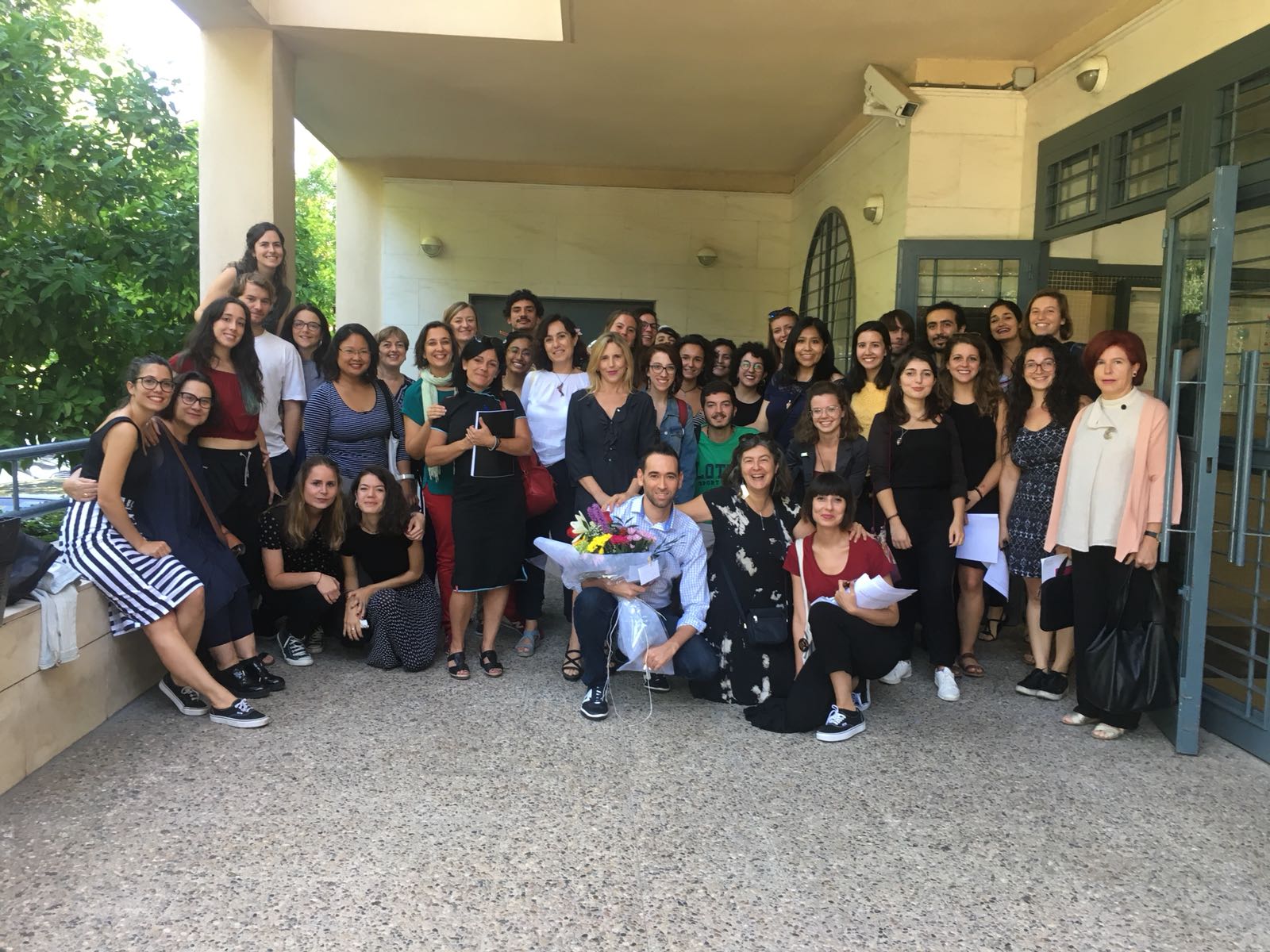
The official presentation of the GEMMA Master’s Degree was celebrated on September 20th at the Francisco A. Muñoz Hall of the Scientific Documentation Center. Mobility students from the XI Edition and first year students from the XII Edition of the GEMMA Master attended this event. The presentation was chaired by the Director of the University Institute for Women and Gender Studies, Ana María Muñoz Muñoz, the coordinator of the GEMMA Consortium Adelina Sánchez Espinosa, the coordinator of the GEMMA Master's Degree at the University of Granada Victoria Robles Sanjuán, the professor Gerardo Rodríguez Salas and the project managers Dresda Emma Méndez de la Brena and Omayra Herrero Soto.
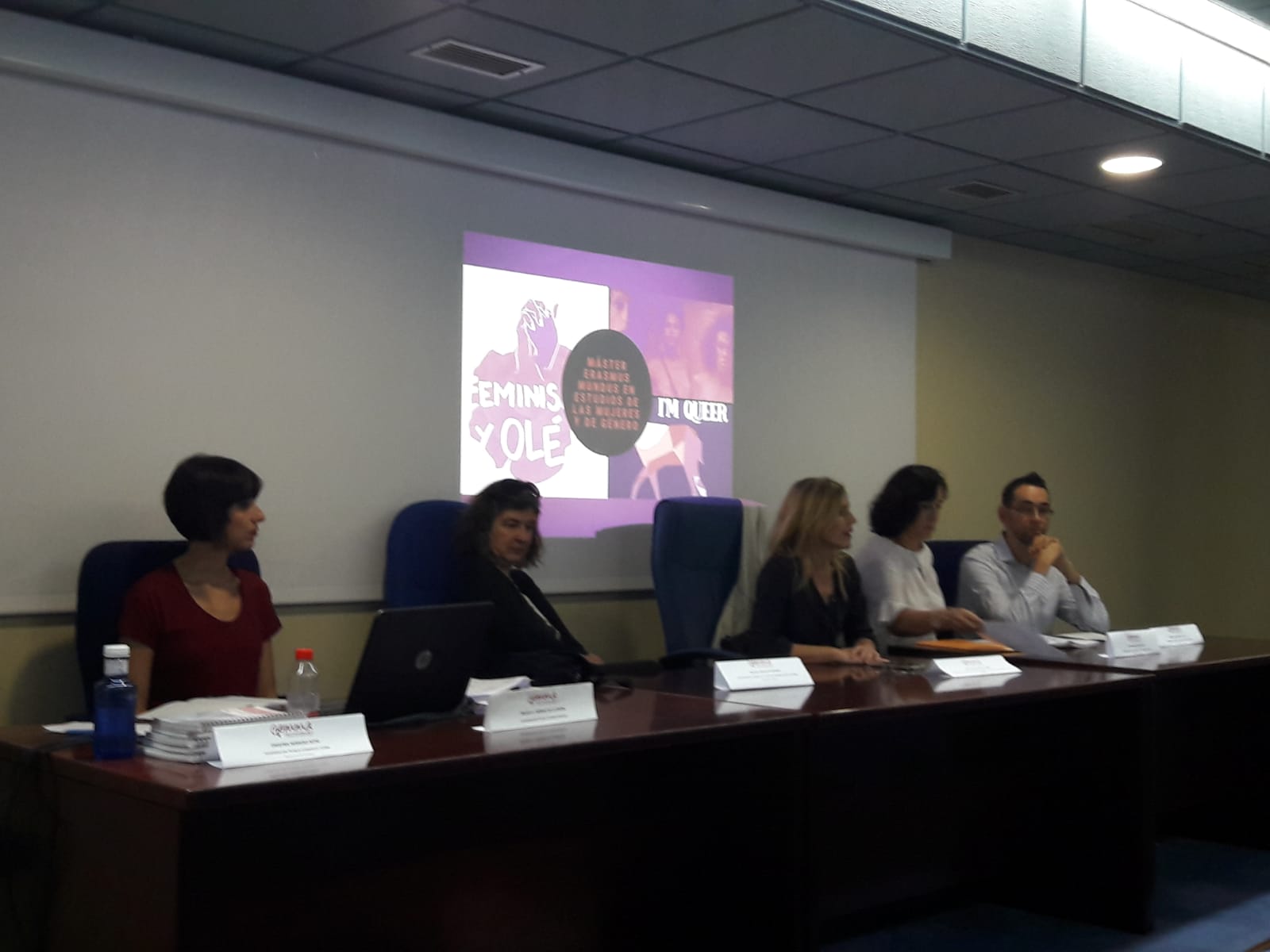
October 2018
Invited Faculty
-
Rocío Medina is professor of the Political Science and Public Law Department at the Autonomus University of Barcelona. Her areas of interest are linked to postcolonial feminist political thought, decolonial studies, and social emancipation theories. Professor Medina visited the GEMMA Master on October 4th and 5th, as an invited professor in the “Women’s Movements” course coordinated by Professor Victoria Robles. During these days, she gave a lecture on diverse issues related to the diversity of feminism’s political subjects, decolonial feminism, and the genealogy of “peripheral” feminisms, including: lesbian, black, third world, Chicana, Islamic, and indigenous feminisms.
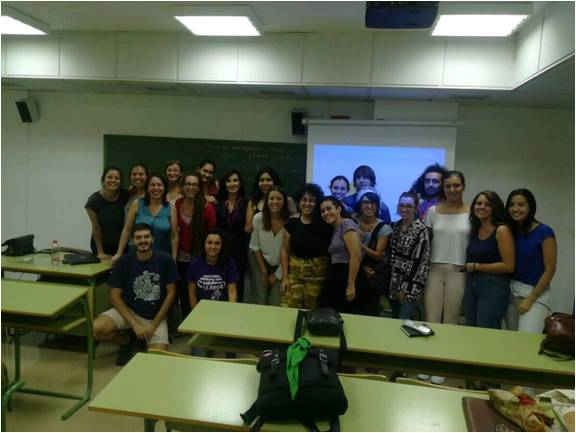
“Documentary Film and Gender In/equalities Visualization” Seminar
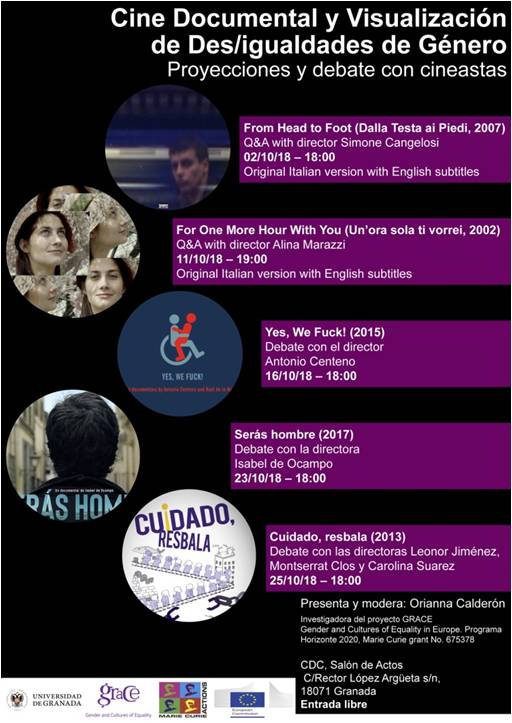
The “Documentary Film and Gender In/equalities Visualization” seminar took place in October 2018. It consisted of a season of documentary films addressing social inequalities from a critical gender perspective. During the seminar, three Spanish and two Italian documentaries were shown, which were produced between 2002 and 2017. Documentary filmmakers were also present to introduce and discuss their films and experience on their work. Furthermore, at the end of each session, students and assistants had the opportunity to exchange their views and opinions with the filmmakers. The movies and filmmakers that were part of this season were: “Dalla Testa ai Piedi”, 2007 (Simone Cangelosi); “Un’ora sola ti vorrei”, 2002 (Alina Marazzi); “Yes, We Fuck!”, 2015 (Antonio Centeno); “Serás hombre”, 2017 (Isabel de Ocampo); “Cuidado, resbala”, 2013 (Leonor Jiménez, Montserrat Clos y Carolina Suárez).
This event was organized by the University Institute for Women and Gender Studies and the H2020 Marie Curie GRACE (Gender and Cultures of Equality in Europe) project, which analyses the relation between gender and culture in seven European countries. The main researcher of this project at the University of Granada is professor Adelina Sánchez Espinosa. The event was presented by Oriana Calderón, who is an Early Stage Researcher (ESR) under the supervision of professor Sánchez, and is part of the “Visualising gender equality in Europe through art and screen” line. Calderón presented relevant ideas and concepts concerning feminist film theory and documentary film theory. It is worth mentioning that this event was also part of the “Gender, Art and Literature” course of the GEMMA Master.
November 2018
Invited Faculty
- Marta Postigo was a guest lecturer in the course coordinated by professor Cándida Martínez, “Teorías Feministas: Igualdad, diferencia y diversidad” (“Feminist Theories: Equality, difference and diversity”). Postigo is teacher at the University of Málaga in the area of Moral Philosophy. Her lines of research are related to citizenship studies, applied ethics and social justice, feminist theory, collective identities in a global context, among others. The lecture she gave on November 7th and 8th revolved around the line of continuity and the contributions of Simone de Beauvoir and Judith Buttler to the intersection between philosophy and feminism. Furthermore, she addressed the contributions of Betty Friedan and Kate Millet to liberal and radical feminism respectively.
- Carmen Castro García visited the GEMMA Master Program as a guest lecturer in the course coordinated by professor Cándida Martínez, “Teorías Feministas: Igualdad, diferencia y diversidad” (“Feminist Theories: Equality, difference and diversity”). Castro holds a PhD in Economy from the University of Pablo de Olavide (Sevilla) and is a specialized researcher on European Gender Policy. During her visit on November 21th, she gave two guest lectures relating to the reconceptualization of work and economy from a gender perspective.
- Marek Wojtaszek is Assistant Professor at the Faculty of International and Political Studies at the University of Lodz in Poland; he is also affiliated with the Department of Transatlantic and Media Studies and Women’s Studies Centre. His main areas of research include American studies, digital and visual culture, philosophy of communication, as well as cultural studies of body and space. Professor Wojtaszek visited the Master GEMMA on November 24th and 26th, and presented his lectures in the courses coordinated by professor Adelina Sánchez Espinosa:“Feminist Research: Case Studies II” and “Gender, Art and Literature”.
Presentation of the Book: “Feminismo o Barbarie” (“Feminism or Barbarity”)

On the 28th of November, GEMMA hosted the presentation of the book: “Feminismo o Barbarie” (“Feminism or Barbarity”). This event counted on the participation of Pilar Aguilar Carrasco, author of the book; Ana María Muñoz Muñoz, Director of the University Institute for Women and Gender Studies; and Tasia Aránguez Sánchez, professor of Philosophy of Law at the University of Granada.
December 2018
Invited Faculty
- Rosa Cobo Bedía is professor at the Sociology Department and director of the Gender and Feminst Studies Center at the University of La Coruña. Professor Cobo visited the GEMMA Master on December 12th, as guest professor of the course: “Teorías Feministas: Igualdad, diferencia y diversidad” (“Feminist Theories: Equality, difference and diversity”) coordinated by professor Cándida Martínez. On this occasion, Professor Cobo gave a lecture regarding the current challenges of feminism, in which she shared with the students her recent work on the imbrication of prostitution and capitalism over the past decades. As part of her latest research, on 2017 she published the book: “La prostitución en el corazón del capitalismo” (“Prostitution at the Heart of Capitalism”).
- Chandra Mohanty is a Distinguished Professor of Women’s and Gender Studies, Dean’s Professor of the Humanities at Syracuse University, and one of the foremost exponents of contemporary decolonial feminism. Her main research and teaching interests are transnational feminist theory and practice, anti-racist education, and politics of knowledge. Professor Mohanty offered a three day seminar on December 12th, 16th and17th, as part of the courses coordinated by professor Adelina Sánchez Espinosa: “Feminist Research: Case Studies II” and “Gender, Art and Literature”. The seminar addressed core theoretical, methodological, and ethical issues in crafting transnational, postcolonial, anti-racist feminist praxis.

-
Satya Mohanty is professor at the Cornell University; his main research areas are critical theory, colonial and postcolonial studies, minority studies, literary and cultural theory, among others. Professor Mohanty gave a 4 day seminar on December 12th, 17th, 19th and 21st, as part of the courses coordinated by professor Adelina Sánchez Espinosa: ““Feminist Research: Case Studies II” and “Gender, Art and Literature”. The seminar covered diverse issues related to the epistemic status of cultural identity and experience, relativism and objectivity. On December 17th, professor Mohanty participated in the series “Feminist Dialogues” organized by the Faculty of Philosophy of the University of Granada; on this occasion he delivered the lecture “On Intersectionality and Epistemic Privilege”.

3rd “Voices GEMMA” Intercultural Forum and Graduation Ceremony
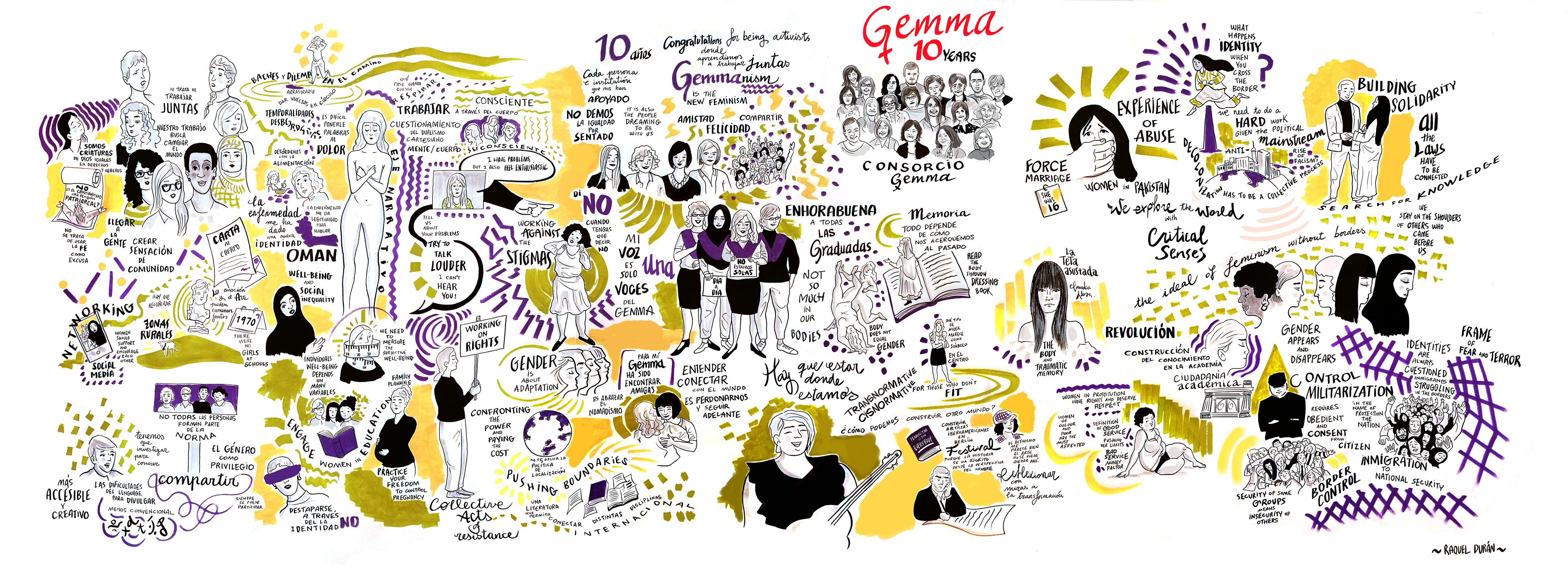
On December 10th and 11th the GEMMA Master hosted the 3rd “Voices GEMMA” Intercultural Forum, an international meeting that brought together graduates of the Master´s Degree The main aim of the meeting was to give graduates the opportunity to share their academic and professional experiences in the field of women’s and gender studies. International experts delivered speeches as part of the event, including Chandra Talpade Mohanty, Distinguished Professor at Syracuse University and one of the world’s foremost exponents of decolonial feminism.The Graduation Ceremony of the V to X editions of the Master GEMMA, took place on December 10th at the Aula Magna of Political Sciences and Sociology Faculty. The ceremony was chaired by Pilar Aranda Ramírez, Rector of the University of Granada; María Dolores Ferre Cano, General Director of Universities (Regional Government Andalucía); Ana Muñoz Muñoz, Director of the University Institute for Women and Gender Studies; and Adelina Sánchez Espinosa, Coordinator of the GEMMA Consortium.
Students, graduates and coordinators joined these activities as part of the celebration of GEMMA’s 10th anniversary. The programme approached its 10th anniversary as the first and only Erasmus+: Erasmus Mundus master’s degree in women’s and gender studies in Europe. GEMMA is a programme of recognised excellence supported by the European Commission. What’s more, it has been selected as an Erasmus Mundus Master Degree three consecutive times (in 2006, 2011, and 2017) from an average of 150 proposals submitted during each respective call. Over the past ten years, more than 800 people from all over the world have completed the master’s degree, 200 of whom have been awarded scholarships. Characterized by the European Commission as the “model in the field of women´s studies and gender studies in a European and global perspective”, the programme has earned several international awards and is currently ranked as the best master’s degree of its kind in Spain by national press agencies.
GEMMA was launched in 2006 as a result of the concerted efforts to harmonize the diverse academic structures of eight different institutions from six European countries, each of which has their own cultures and traditions: University of Granada (programme coordinator), University of Bologna (Italy), Central European University (Hungary), University of Hull (UK), University of York (UK), University of Lódź (Poland), University of Oviedo and Utrecht University.
Adelina Sánchez Espinosa, general coordinator of the GEMMA consortium, pointed out that: “We celebrate our 10th anniversary by reaffirming the continuing need to boost knowledge sharing in women’s and gender studies through collaboration among participants from numerous and highly diverse countries. We feel that the dissemination of our knowledge is fundamental in order to tackle growing inequalities and injustices which are present throughout the world.” 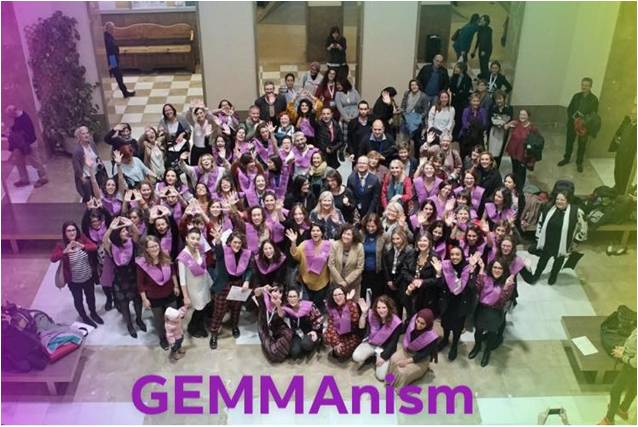
For further information on this event please visit: III Gemma Graduation Ceremony
January 2019
Invited Faculty
- Paula Martín Salván, professor of English Philology at the University of Córdoba and member of the research group “Writs of Empire”, visited the Master GEMMA on January 8th as a guest professor in the course “Gender, Art and Literature”, coordinated by professor Adelina Sánchez Espinosa. Her research focuses on the field of North American literature, modernist and postmodernist novel, critical theory, literary theory, and political and aesthetic thought in the 18th century. Professor Martín has addressed the work of authors such as Don DeLillo, Thomas Pynchon, Cormac McCarthy, J.M. Coetzee, Joseph Conrad, Graham Greene, Robert Cooveras well as Cervantes’ influence on North American novelists and postmodernism.
- María Jesús López Sánchez-Vizcaíno teaches at the English and German Philology Department at the University of Córdoba. Her main research interests are English-written South African literature, postcolonial literature and British modernism. Her approaches to research are based on the deconstruction as well as the community theories, with the aim of further studying the relationship between literature and ethics. Professor López has published work on authors such as J.M. Coetzee, Virginia Woolf, Samuel Beckett, Margaret Atwood, Zakes Mda and Phaswane Mpe. On January 9th, she was invited to give a lecture in the course “Gender, Art and Literature”, coordinated by professor Adelina Sánchez Espinosa.
- Montserrat Cabré, is professor of History of Science at the University of Cantabria, and founder of the Interdisciplinary Centre for Women and Gender Studies “Isabel Torres”, which was under her direction between 2004 and 2010. Her main area of research is the history of women, where she specialises on the history of medicine, of science and of culture. Professor Cabré was the guest scholar in the course coordinated by professor Teresa Ortiz, “Género, Cuerpo y Mujeres en la Historia de Occidente: Prácticas de Salud y Discursos Científicos” (“Gender, Body and Women en Western History: Health Practices and Scientific Discourses”). During the lecture that she delivered on January 14th, she addressed the subjects of women’s authority and authorship in medieval medicine, and women’s health practices during the same period.
- Beatriz Ferrús Antón is professor of Hispano-American Literature at the Autonomus University of Barcelona; her academic interests are oriented towards the recovery of women writers in the 18th and 19th centuries in Latin America, as well as other contemporary female authors. Professor Ferrús was invited to the course coordinated by professor Milena Rodríguez: “Metodologías Feministas B: Análisis e interpretación de textos literarios e imágenes de mujeres” (“Feminist Methodologies B: Analysis and Interpretation of women’s literary texts and images”). Her lecture on January 18th revolved around Women and Travel Literature in the nineteenth century; she revisited women’s professional writing in the transatlantic triangle of Latin America, Spain and North America.
- Elena Casado Aparicio is a professor at Universidad Complutense de Madrid, member of the Ordinary Sociology group and coordinator of the “Health and Society” project linked to the course she teaches at the Nursing Faculty. Her research interests are linked to the ethics of care, gender relations, and sociology of communication. Professor Casado visited the Master GEMMA on January 21st, 22nd, and 23rd, as the guest scholar in the course “Metodologías Feministas C: Ciencias sociales y crítica feminista. La metodología etnográfica y el diseño de proyectos de investigación social cualitativos” (“Feminist Methodologies C: Social Sciences and Feminist Critique. Ethnographic Methodology and Design of Qualitative Research Projects”) coordinated by professor Ana Alcázar Campos. The seminar addressed her proposal of an ordinary, vulnerable, and feminist epistemology as well as the potentialities of technologic and emotional mediations for research work.
- Paloma González teaches at Universitat Autónoma de Barcelona and co-directs the Centre d'Estudis del Patrimoni Arqueològic de la Prehistòria CEPAP (Centre of Studies of Prehistoric Archaeological Patrimony). Her investigation focuses on the theoretical and methodological issues of feminist archaeological research, and public archaeology. She has studied subjects such as: Women’s and Gender Relations Archaeology, Prehistoric Archaeology, Public Archaeology, Patrimony and Historic Memory, and Recent Prehistory of the Mediterranean. Professor González was invited to the course coordinated by professor Margarita Sánchez, “Gender and Archeology”, on January 23rd, 24th, and 25th.
- Eleonora Federici is Associate Professor of English and Translation Studies at the University of Naples L’Orientale. She has coordinated research groups for European Thematic Networks on specialised translation. Her main areas of research are Translation Studies, Gender Studies and English varieties. On January 28th, professor Federici offered the seminar “Contexts Matter: Feminist Translation between Ethics, Aesthetics and Politics”. This seminar outlined the state of art of the European gender translation and pointed out the theoretical, practical and ethic challenges for feminist translation.
Visit to the Archaeological Museum of Granada
On January 29th, GEMMA’s students visited the Archaeological and Ethnological Museum of Granada. This activity was carried out as part of the course “Gender and Archeology”, coordinated by professor Margarita Sánchez. The purpose of this visit was the critical observation of the symbolic representations of women in past societies and the valorisation of women’s activities. 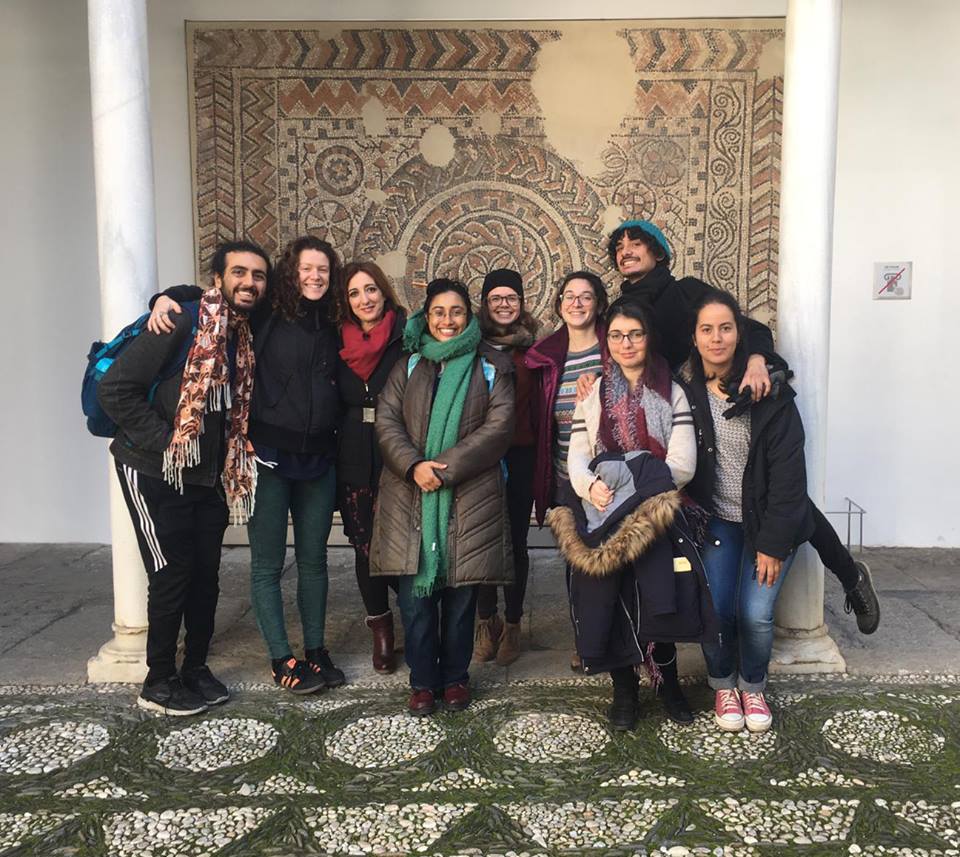
February 2019
Invited Faculty
- Katherine O’Donnell, professor at the University of Dublin, was our guest scholar on 12th and 13th of February in the “Feminist Research: Case Studies II” course, coordinated by professor Adelina Sánchez Espinosa. Professor O’Donnell’s main lines of research are linked to the History of Ideas, and Feminist and Gender Theory.
- Olga Castro is professor and Head of Translation Studies at the University of Aston. Her research focuses on the political and social role of translation in the construction of gender and on cultural/national identities in a transnational world. Her research areas include feminist translation studies (namely approaches from historiography, literature, cultural studies and linguistics), translation in minorized and non-hegemonic cultures, the analysis of transnational travels of texts, as well as self-translation in multilingual contexts. Professor Castro visited the GEMMA Master in February 14th, as a guest lecturer in the course “Geopolíticas del Conocimiento, Género y Traducción: Del Giro Discursivo al Giro Decolonial” (“Geopolitics of Knowledge, Gender and Translation: From the Linguistic Turn to the Decolonial Turn”), coordinated by professor Lola Sánchez.
- Agata Ignaciuk is member of the Institute of Ethnology and Cultural Anthropology of the University of Warsaw and the University Institute for Women and Gender Studies of the University of Granada. Her areas of interest are social and cultural history of medicine, history of reproduction and reproductive rights, history of pharmaceutical marketing, history of women and gender, comparative history, and transnational history. On February 18th and 19th, professor Ignaciuk visited professor Teresa Ortiz’s course, “Género, Cuerpo y Mujeres en la Historia de Occidente: Prácticas de Salud y Discursos Científicos” (“Gender, Body and Women in Western History: Health Practices and Scientific Discourses”). On this occasion, her lecture revolved around contraceptive practices and policy in Europe and America in the 20th century; and abortion activism and state regulations during the Cold War.
- Beatriz Revelles is a postdoctoral scholar at the University of Barcelona. Her current research is linked to the area of higher education and pedagogy. She is particularly interested in finding feminist alternative ways to teach literature and communication in the information society. Professor Revelles, gave her lecture on February 20th in the course “Gender, Art, and Literature”, coordinated by professor Adelina Sánchez Espinosa.
Presentation of the Book: “Mujeres en la ciencia contemporánea. La aguja y el camello” (“Women in Contemporary Science. The needle and the camel”)
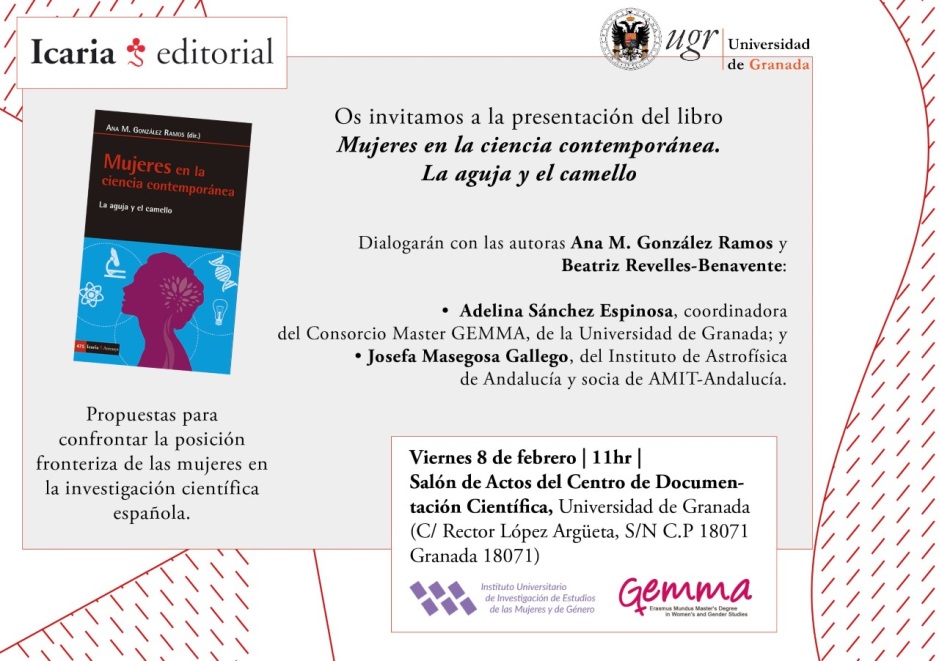
On the 8th of February, the GEMMA Master hosted the presentation of the book “Mujeres en la ciencia contemporánea. La aguja y el camello” (“Women in Contemporary Science. The needle and the camel”). This event was chaired by Ana M. González Ramos and Beatriz Revelles, authors of the book; professor Adelina Sánchez Espinosa, Coordinator of the GEMMA Consortium; and Josefa Masegasa Gallego, from the Astrophysics Regional Institute. The book addresses the position of female researchers in the context of an androcentric culture with predominant patriarchal structures. It highlights how the imposition of traditional gender roles and corporate objectives from an academic neoliberal model, result in women researcher’s discrimination and overshadowing of their brilliant careers.
The authors ask for a change of the scientific community’s attitude at the Spanish university departments. The incorporation of a gender agenda in science is urgent, in order to include women’s talent more efficiently and recognize their investigation skills. The book offers a critical account of the scientific environment and offers strategies for defying the marginal position of women in scientific investigation, the causes of their withdrawal, the impacts on their health as a result of meritocracy and competitiveness, the instability and invisibility of their work, the gender gaps, the power relations, and the struggle against masculine exercise of power.
Visit to the European Centre for Women Mariana Pineda
Thursday, February 12th the GEMMA Master students visited the European Centre for Women “Mariana Pineda”. This activity was carried out as part of the course “Recursos bibliográficos documentales para los estudios de las mujeres” (“Bibliographic Documental Resources for Women’s Studies”). The visit was coordinated by Ana Mª Muñoz Muñoz, coordinator of the course and director of the University Institute for Women and Gender Studies.
Talk: “Subjects of feminisms: a conversation from plurality"
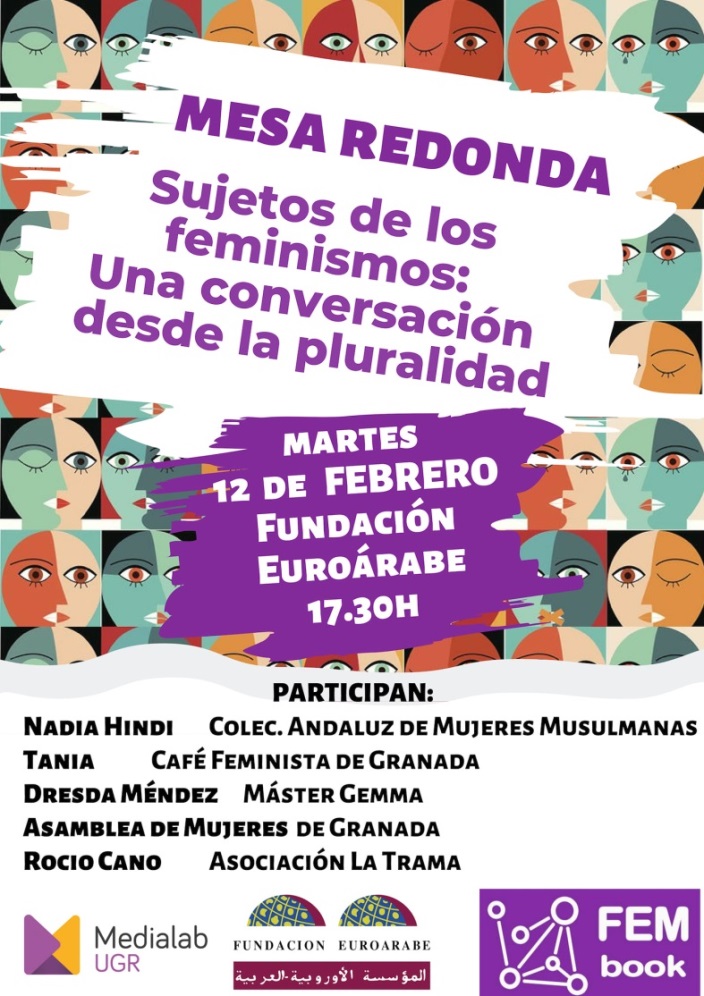 Thursday, February 12th the talk “Subjects of feminisms: a conversation from plurality” took place at the Euro-Arabic Foundation for Advanced Studies. Dresda Méndez was invited to take part on the conversation as representative of the GEMMA Master, along with Nadia Hindi (Andalusian Collective of Muslim Women), Tania delle Luche (Feminist Café of Granada), Rocío Cano (La Trama Asociation), y Mercedes Belbel (Feminist Assembly of Granada). This event belongs to La FEMbook Network, a communication project aimed at social change and women’s empowerment.
Thursday, February 12th the talk “Subjects of feminisms: a conversation from plurality” took place at the Euro-Arabic Foundation for Advanced Studies. Dresda Méndez was invited to take part on the conversation as representative of the GEMMA Master, along with Nadia Hindi (Andalusian Collective of Muslim Women), Tania delle Luche (Feminist Café of Granada), Rocío Cano (La Trama Asociation), y Mercedes Belbel (Feminist Assembly of Granada). This event belongs to La FEMbook Network, a communication project aimed at social change and women’s empowerment.
Open and mixed debate: “The role of men in feminisms”
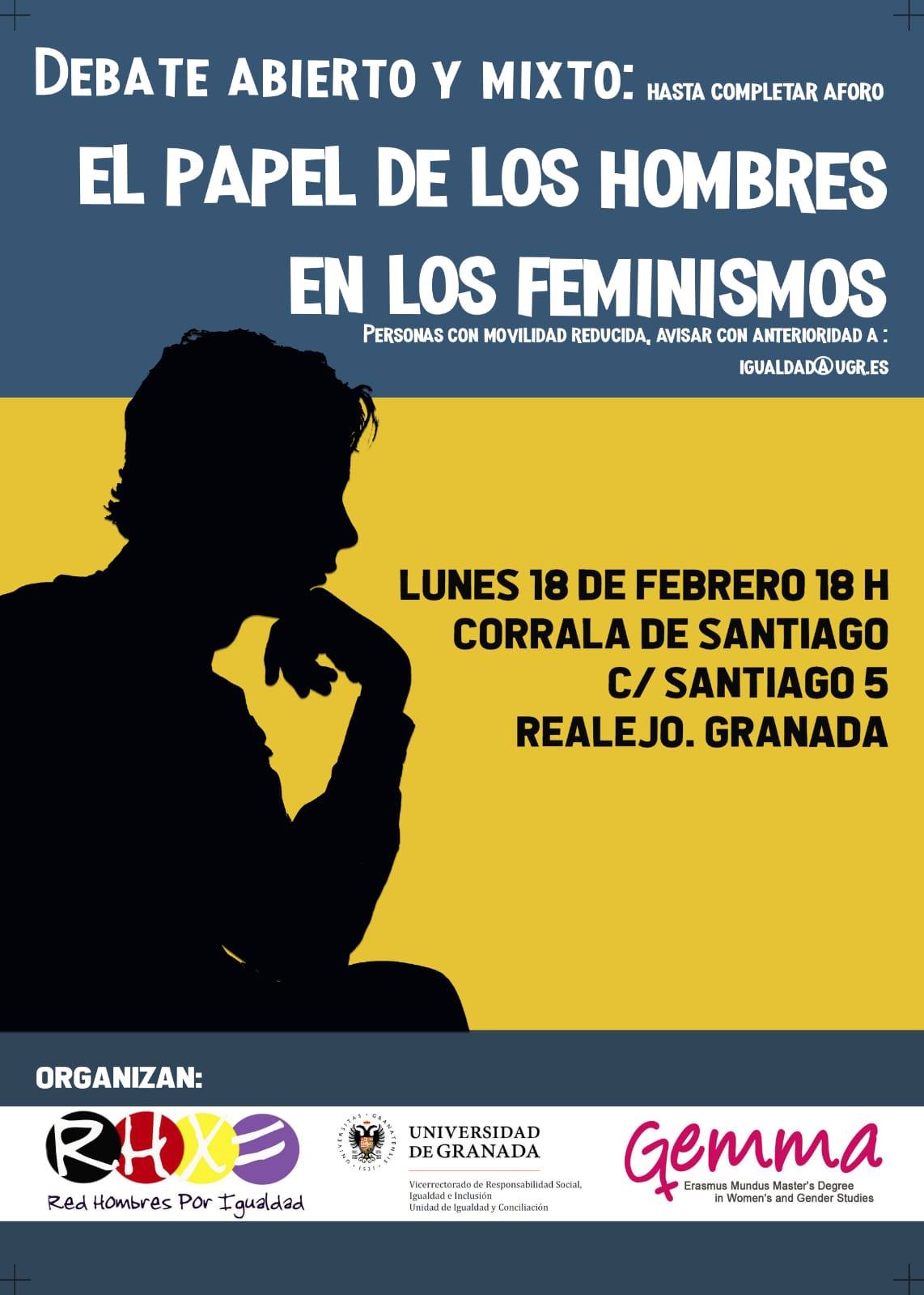
On February 18th, the Master GEMMA co-organized the debate “The role of men in feminisms” in collaboration with the Network of Men for Equality and the Equality and Conciliation Unit of the University of Granada. This event gathered the students as well as other local participants, who engaged in a horizontal dialogue and exchanged their thoughts on the role of men, their strategies both in feminist spaces and in their own spaces of reflection on masculinity.
"Motherhood and Politics. A Feminist Anthropology Approach" Seminar
On the 20th and 22nd February, professor Renata E. Hryciuk held the Seminar: “Motherhood and Politics. A Feminist Anthropology Approach” and the Methodological Workshop: “Studying power - doing fieldwork among those we (dis)agree with”. The seminar covered diverse issues related to motherhood social movement in Poland; public policies and indigenous woman in Mexico; power relations and research privilege.
March 2019
Invited Faculty
-
Araceli Guiote González, is professor and coordinator of the Master’s Degree in Art Therapy for Social, Clinic, and Psychoeducative Intervention at the University of Granada. She offers therapeutic counseling at her private practice and runs art therapy workshops that integrate a gender perspective. On February 12th, professor Guiote was a guest teacher in the course: “Investigaciones feministas: Casos de estudio I” (“Feminist research: Case Studies I”), coordinated by professor Gerardo Rodríguez Salas. During her visit, she invited the students to explore emotional synesthesia by means of their own artistic creation.
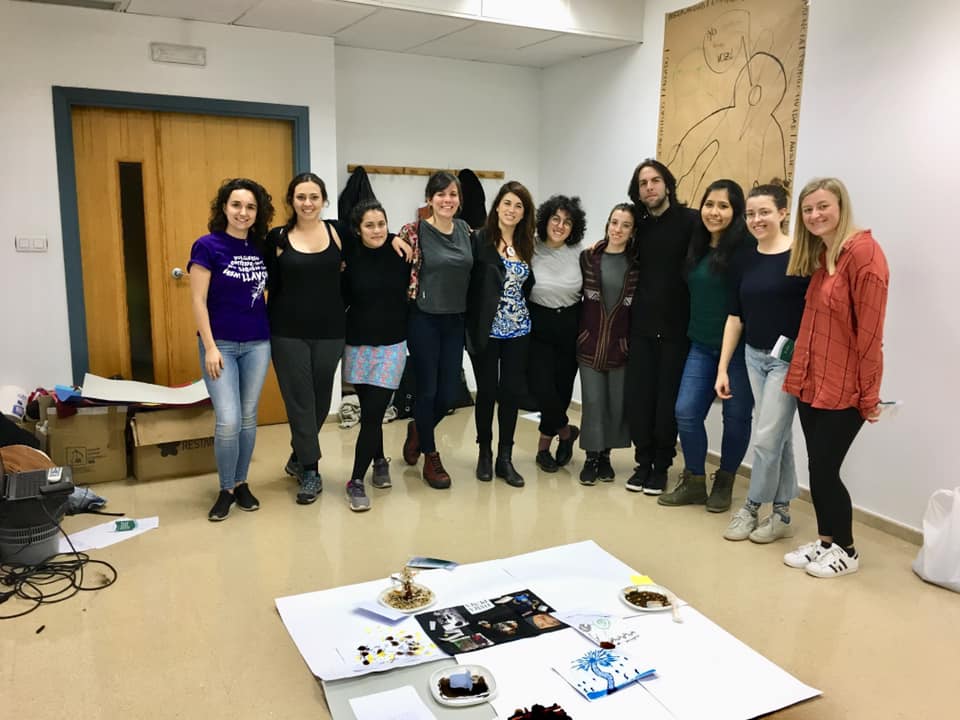
-
Ioana Gruia, is writer and professor at the General Linguistic and Literary Theory Department at the University of Granada. Her main lines of research are Comparative Literature, Spanish Contemporary Literature, Literature and Gender Studies and Romanian Literature. In addition, she has been awarded various prizes for her literary work. Her production includes books such as: Otoño sin cuerpo (Autumn without Body), Nighthawks, Eliot y la escritura del tiempo en la poesía española contemporánea (Eliot and the Writing of Time in Contemporary Spanish Poetry), El sol en la fruta (The Sun in the Fruit) y La vendedora de tiempo (The Time Saleswoman). Professor Gruia was invited to GEMMA on February 19th and 21st, joining professor Gerardo Rodríguez Salas’ course, “Investigaciones feministas: Casos de estudio I” (“Feminist research: Case Studies I”).
International Women’s Day at Granada
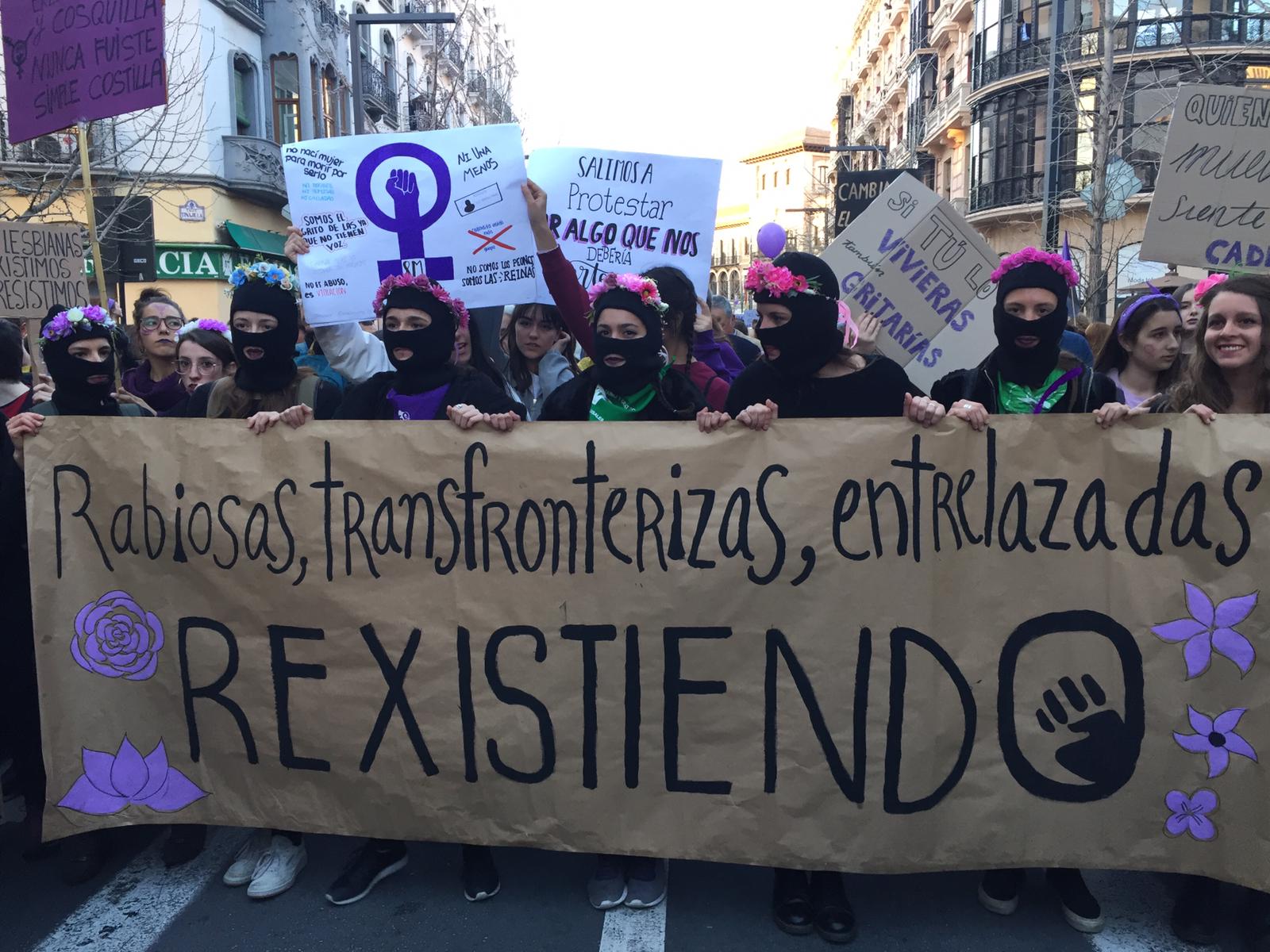
On March 8th, Granada’s streets fostered an historical feminist mobilization. With the participation of over 60.000 people, this year’s women’s strike was one of the biggest demonstrations in the history of Granada, and a huge accomplishment for the city’s feminist movement. Chants and slogans demanding justice, equality, and the eradication of an oppressive, patriarchal system filled the streets. These demands have become even more urgent given the recent resurgence of patriarchal forces in Spain, Europe, and all over the world.
The GEMMA students took part in the march. Coming from very diverse contexts, they brought to Granada their local ways of demonstrating in the public space and raised their voices for the multiple struggles they represent. Their commitment was with a feminism that expands across the borders and brings together the demands of women in all corners of the world.
“Economy and Society” Film Season / “Machismo and Patriarchal Society” Debate
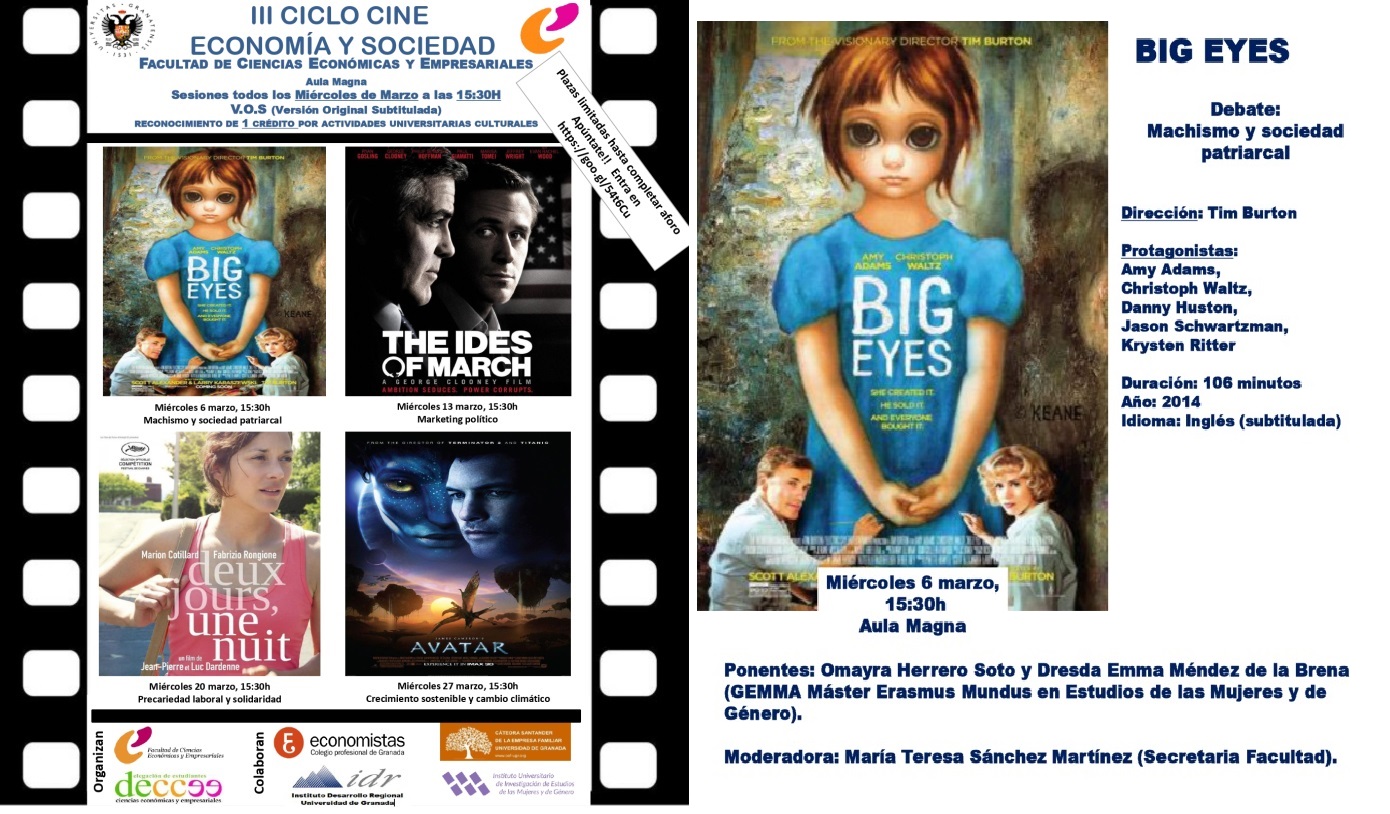
The GEMMA Master and the University Institute for Women and Gender Studies collaborated on the 3rd version of the “Economy and Society” Film Season chaired by the Economic and Business Sciences Faculty of the University of Granada. In the context of the International Women’s Day, Omayra Herrero Soto and Dresda Méndez de la Brena, coordinators of the GEMMA, moderated a debate about Machismo and Patriarchal Society, following the screening of the movie “Big Eyes” (2014).
"Dissident Masculinities” Film Season
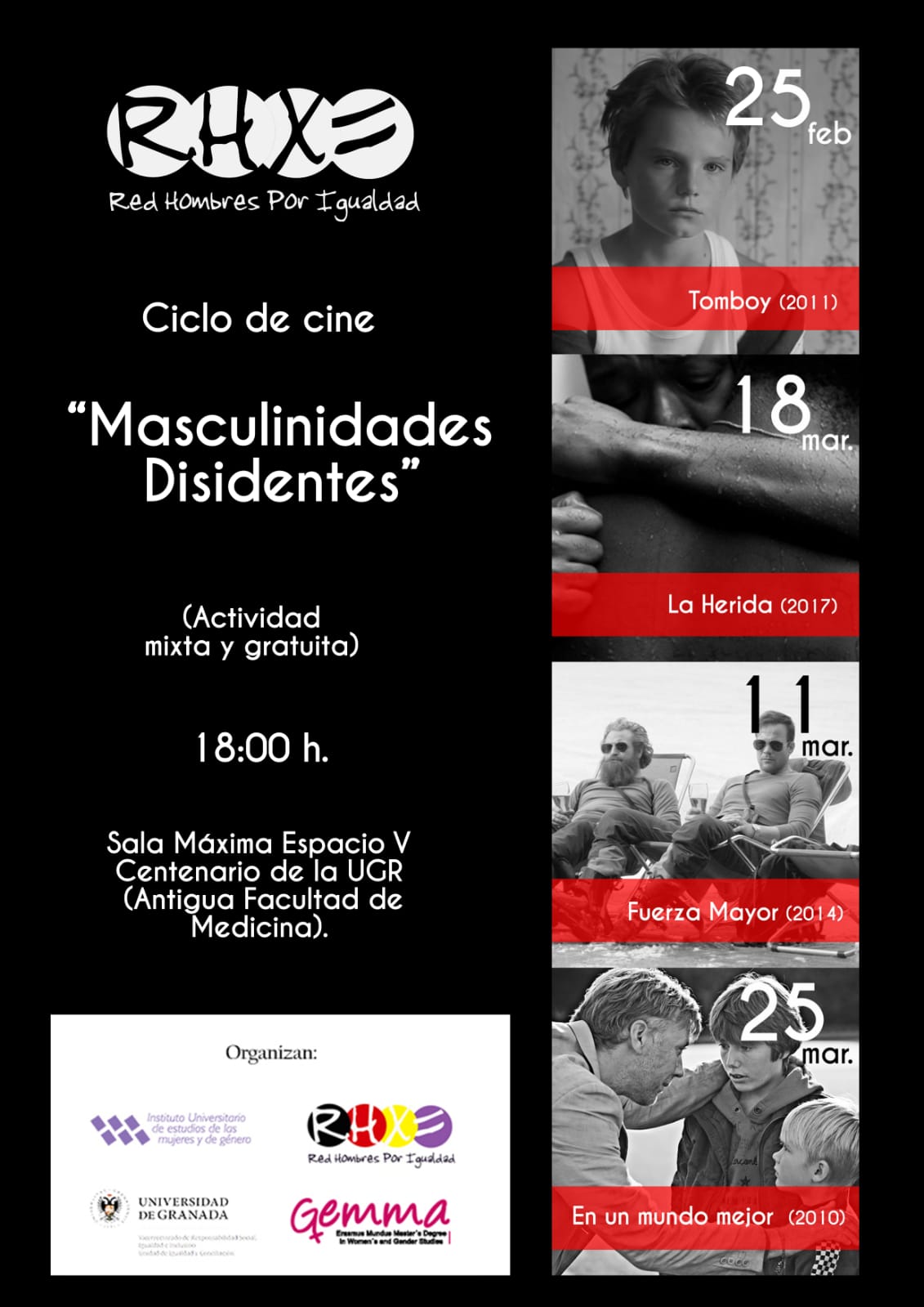
Starting on late February and continuing throughout March, the Master GEMMA co-organized the Film Season “Dissident Masculinities”, along with the Network of Men for Equality, the Equality and Conciliation Unit of the University of Granada, and the University Institute for Women and Gender Studies. 4 movies were selected and shown: “Tomboy” (2011), “Force Majeure” (2014), “The Wound” (2017), and “In a Better World” (2010). This space was conceived as an opportunity for reflecting on masculinities construction in today’s societies. After each film, the organizers promoted a debate about issues such as: care, fatherhood, domestic and familiar responsibilities, sexualities, violence, privilege, among others.
Shared Feminist Conversations: Presentation of the book “Hijas de un sueño” (“Daughters of a Dream”)
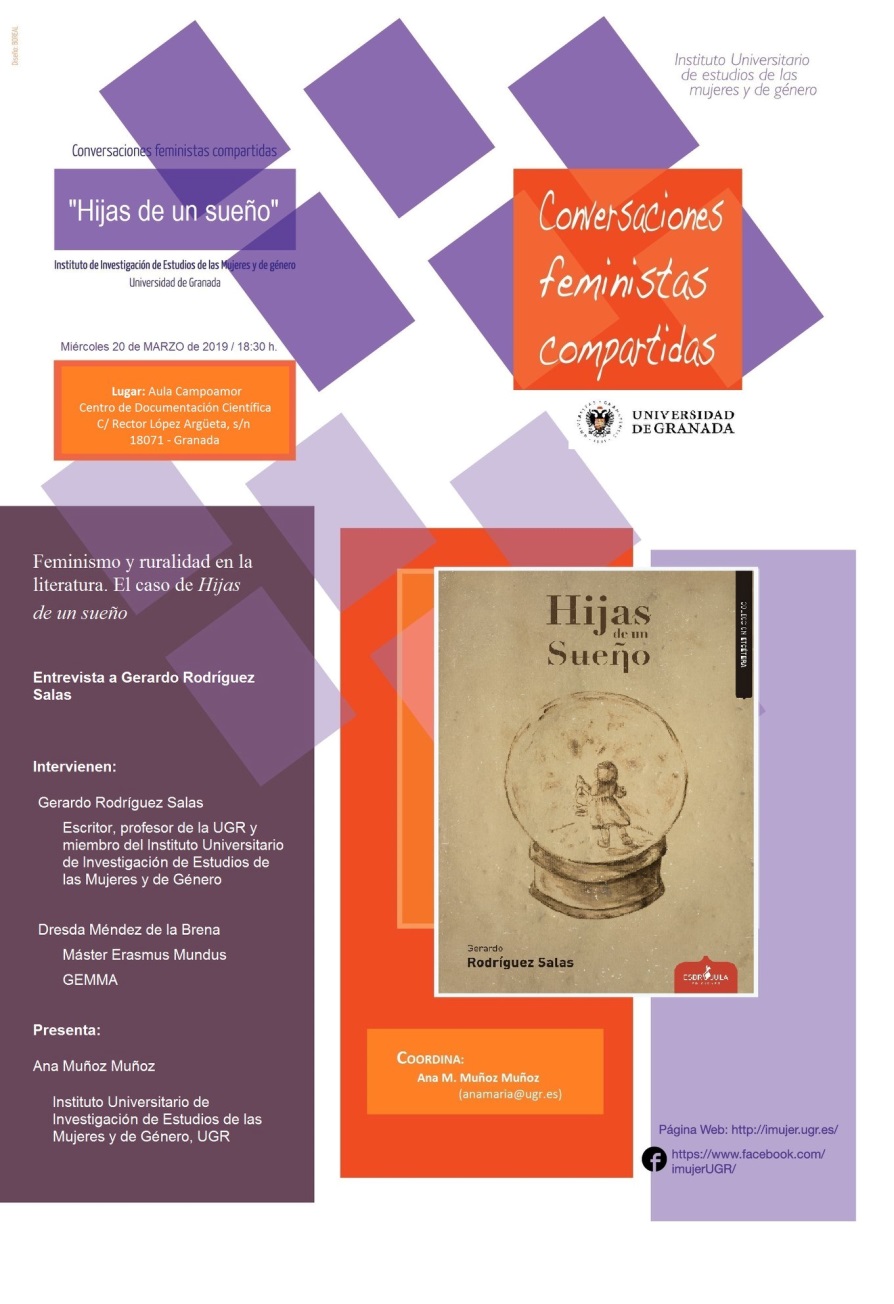 On March 20th, the GEMMA Master took part in the interview and conversation concerning the book “Hijas de un sueño” (“Daughters of a Dream”). Set as part of the Shared Feminist Conversations meetings, the event was introduced by Ana Mª Muñoz Muñoz, director of the University Institute for Women and Gender Studies. The discussion of the book was in charge of Gerardo Rodríguez Salas, author of the book and professor in the Master GEMMA, and Dresda Méndez de la Brena, coordinator of the Master GEMMA at the University of Granada.
On March 20th, the GEMMA Master took part in the interview and conversation concerning the book “Hijas de un sueño” (“Daughters of a Dream”). Set as part of the Shared Feminist Conversations meetings, the event was introduced by Ana Mª Muñoz Muñoz, director of the University Institute for Women and Gender Studies. The discussion of the book was in charge of Gerardo Rodríguez Salas, author of the book and professor in the Master GEMMA, and Dresda Méndez de la Brena, coordinator of the Master GEMMA at the University of Granada.
Resulting from professor Rodriguez’s ethnographic research, the book “Hijas de un Sueño” (“Daughters of a Dream”) recovers Andalusian speech and combines it with a lyric and universal narration that goes beyond geographic limits, giving prominence to rural women and LGBTI communities.
At the base of this fiction are the feminist theories of authors such as Bonnie Smith, Cristina Segura, Teresa del Valle and Mari Luz Esteban, whose work defends the construction of an alternative history for women emerging from situated knowledge. Taking place in rural Andalucía, a place of subalternity where women have been invisible, the book calls into question the objectivity of patriarchal narrations official history and rewrites Andalucía moving away from stereotypes, without sacrificing localism and popular folklore.
“Hijas de un Sueño” (“Daughters of a Dream”) offers alternative voices, insisting on fluid gender identities and empowering spaces. It also recreates Andalusian speech, recovering rural women’s sayings and expressions.
Some of the issues covered in the conversation were: historic memory, Spanish civil war, women and rurality, representation and denunciation of gender violence in literature, sex identity and spirituality. 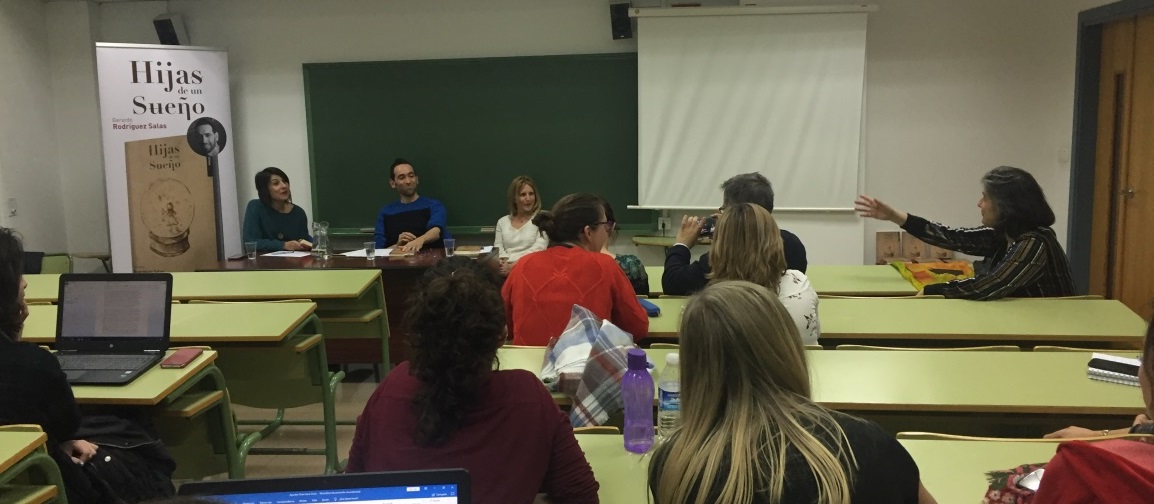
Visit to Archivo Histórico de Protocolos de Granada (Granada’s Historical Archives of Protocols)
On March 22nd, GEMMA’s students visited Granada’s Historical Archives of Protocols. This activity was carried out as part of the course “Género, clase y raza en la América Colonial” (“Gender, class and race in Colonial America”), coordinated by professor María Ángeles Gálvez Ruiz . The visit was guided by Amalia García Pedraza, who has a PhD in History and is an archivist in the facility where the activity took place. During the visit the students were introduced to the use of notarial documents for research purposes on the field of Gender Studies. 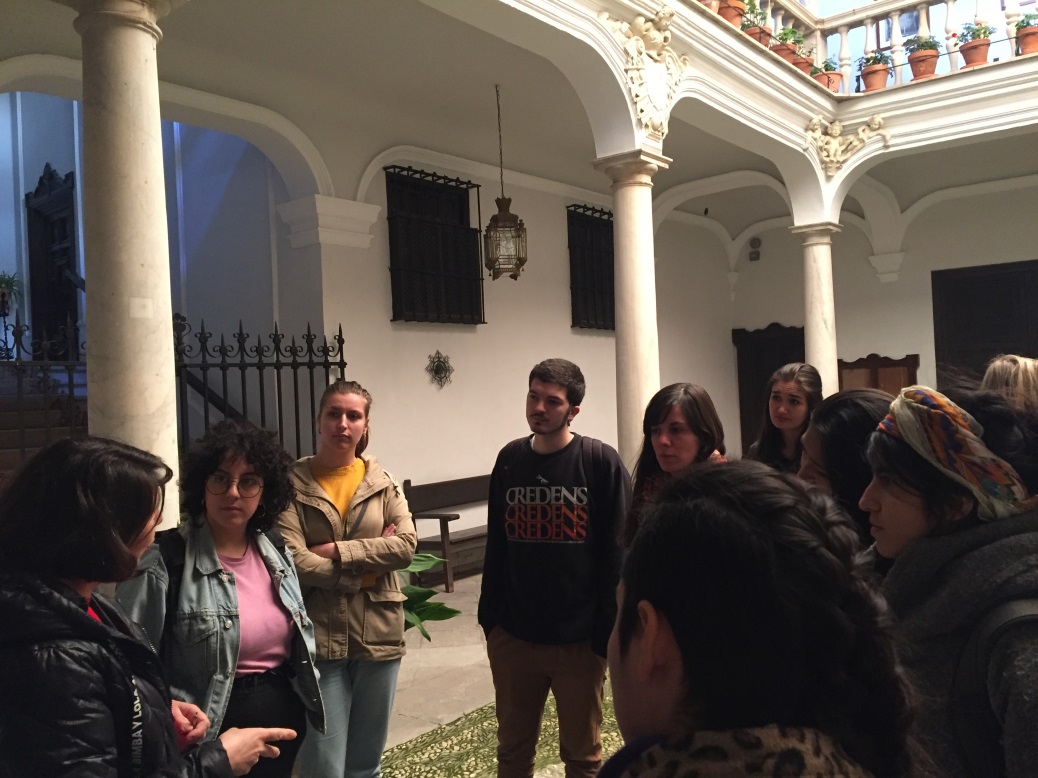
April 2019
Invited Faculty
- Belén Agrela Romero is professor at the Social Work and Social Services Department at the University of Jaén and local coordinator of the joint PhD programme in Migration Studies organized by the University of Granada, University of Jaen, and University Pablo de Olavide. Her main research interests revolve around Gender and Feminism, Social Work, Migrations, Public Policy for Social Action, Care Management, Gender Violence, and Education. Professor Agrela was an invited scholar in the course “Trabajo social e intervención social con perspectiva de género” (Social Work and Social Intervention with Gender Perspective”), coordinated by professors Amalia Morales Villena and María Espinosa Spínola. On the classes of the 8th and 9th of April, professor Agrela addressed the impact of gender analysis on the definition of social problems, social interventions and professional practice.
- Carmen Agulló Díaz teaches Theory and History of Education at the University of Valencia. Her research focuses on the history of women’s education, with special interest on the history of women teachers of Valencia during the Second Spanish Republic. Professor Agulló visit on the 25th and 26th of April was part of the Master GEMMA course “Transformaciones socioeducativas en la España del siglo XX: feminismo y propuestas de igualdad” (“Socio-educative transformations in 20th century Spain. Feminism and equality proposals”) in charge of the professor Victoria Robles Sanjuán.
Conference: “Three feminine characters in contemporary Chinese literature and their cinematographic adaptations”
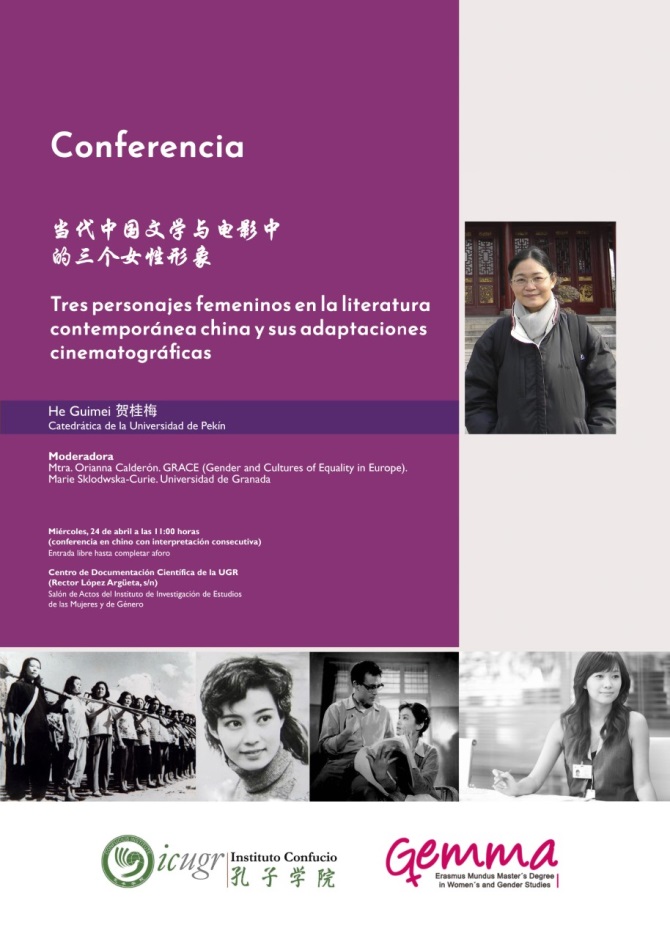
On the 24th of April the GEMMA Master co-hosted the conference “Three feminine characters in contemporary Chinese literature and their cinematographic adaptations” in collaboration with the Confucius Institute of the University of Granada. The conference was delivered by the invited speaker He Guimei, and was moderated by Oriana Calderón, GRACE researcher.
He Guimei is professor at the Faculty of Chinese Language and Literature of the University of Peking. She specializes in History of Modern and Contemporary Chinese Literature, Twentieth-century Women’s Literature in China, and Chinese Popular Culture and Contemporary Thought. She has published numerous academic articles and has been awarded several national prizes for her academic work.
He Guimei’s lecture addressed the representations of women during three periods of contemporary China, making connections between the predominant images of women and the forms of social organization ruling in each period. Three female representations were explored: the peasant woman, the intellectual woman, and the middle-class women, all of which reflected the transformations and challenges faced by Chinese women under their respective contexts: the rural communes under Mao’s government, the working units in the New Epoch in the late 70s, and the working conditions in the context of globalization in the 90s and the 21st century. Despite the presence of these female representations in the emergent sectors of Chinese society, women have always been considered “second class” citizens due to the prevalence of a patriarchal structure underlying the social order.
Conference: “Family, gender and patriarchy in the digital era in China”
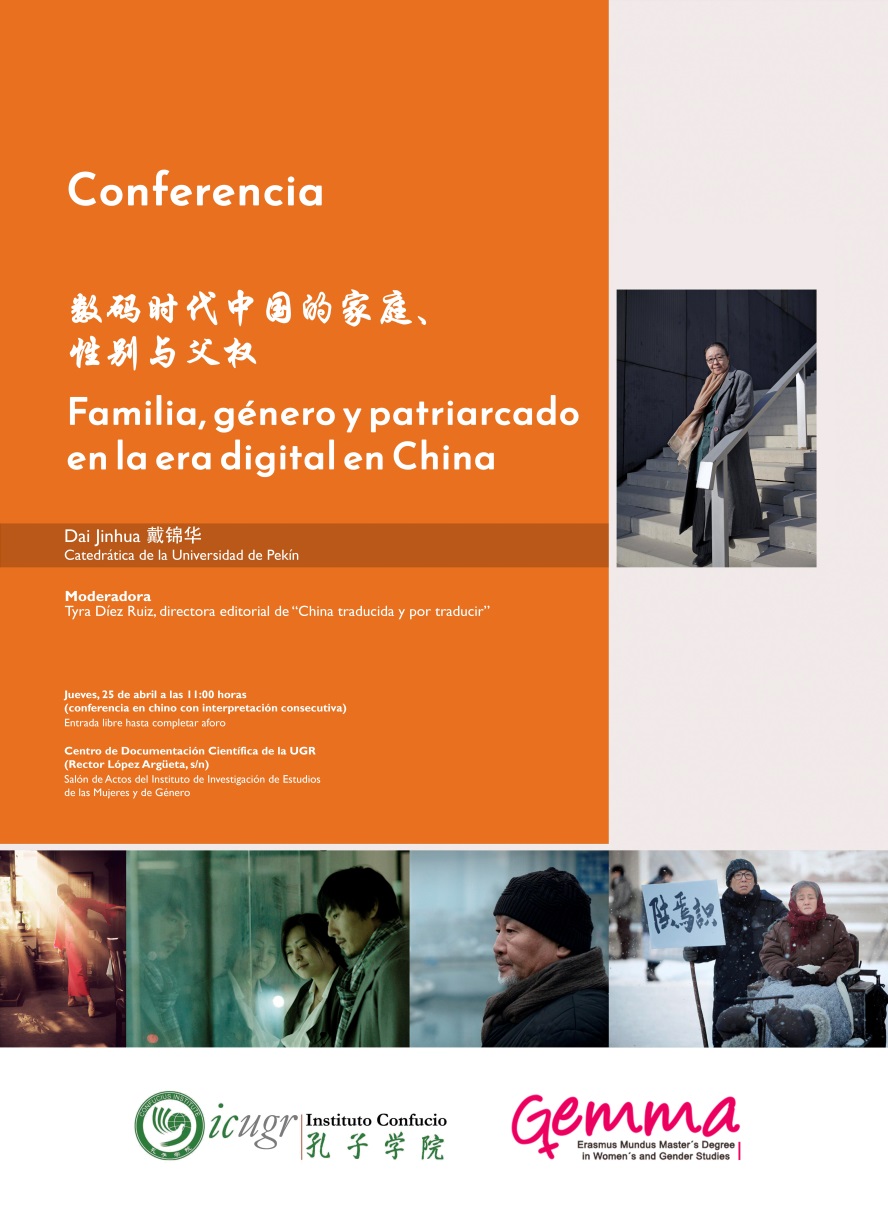
On the 25th of April the GEMMA Master co-hosted the conference “Family, gender and patriarchy in the digital era in China”, in collaboration with the Confucius Institute of the University of Granada. The conference was delivered by the invited speaker Dai Jinhua, and was moderated by Tyra Díez, editorial director of “China traducida y por traducir”.
Dai Jinhua is professor at Peking University as well as a critic and researcher in the fields of Chinese culture, popular mass culture and feminist literature. In addition, she is a pioneer in the study and theorisation of feminism in China and in cultural studies Dai Jinhua has also contributed to the creation of the first specialty on Cinematographic Historicism in her country. Among other things, she has taught, has given lectures and has offered fellowships at numerous universities in China and other countries. In 1997, she set up the first comparative literature research centre in China. She has been director of the Cinema and Cultural Research Centre at her university since 2008. Last but not least, she has published over a hundred academic articles and sixteen books.
Conference Cycle “Feminisms in cultural diversity: challenges in the current juncture”
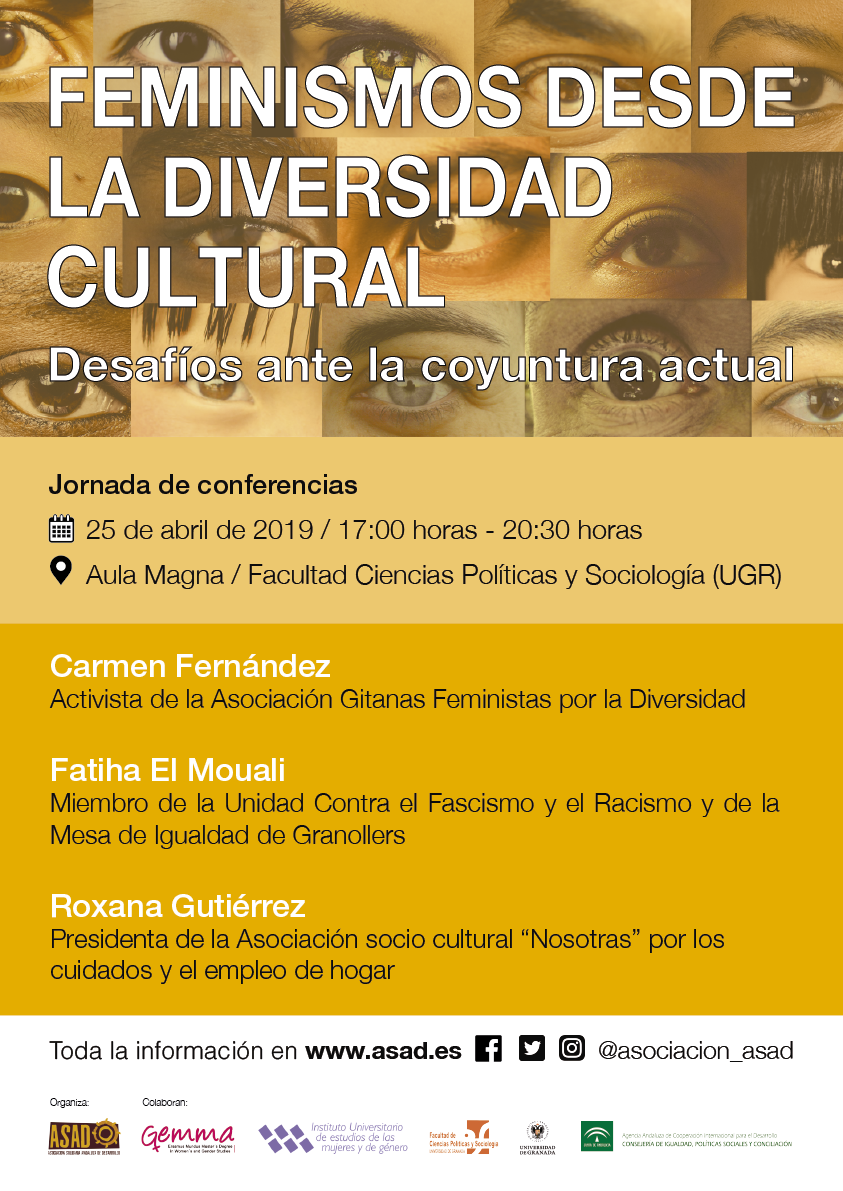 The Conference Cycle “Feminisms in cultural diversity: challenges in the current juncture” was held on the 25th of April. The event was organised by ASAD (Andalusian Solidarity Development Association) in collaboration with the GEMMA Master and the Faculty of Political Science and Sociology of the University of Granada. The speakers invited to participate were: Carmen Fernández, activist of the Gyspsy Feminists for Diversity Asociation; Fatiha El Mouali, Member of the Unit against Fascism and Racism; and Roxana Gutiérrez, president of “Nosotras” Asociation of care workers. The conference gathered different associations that struggle for gender equality and cultural diversity, fostering the diffusion, reflection and exchange of experiences, objectives and challenges that they face.
The Conference Cycle “Feminisms in cultural diversity: challenges in the current juncture” was held on the 25th of April. The event was organised by ASAD (Andalusian Solidarity Development Association) in collaboration with the GEMMA Master and the Faculty of Political Science and Sociology of the University of Granada. The speakers invited to participate were: Carmen Fernández, activist of the Gyspsy Feminists for Diversity Asociation; Fatiha El Mouali, Member of the Unit against Fascism and Racism; and Roxana Gutiérrez, president of “Nosotras” Asociation of care workers. The conference gathered different associations that struggle for gender equality and cultural diversity, fostering the diffusion, reflection and exchange of experiences, objectives and challenges that they face.
May 2019
Invited Faculty
- Grazyna Zygadlo is an assistant professor in the Department of American Studies and Mass Media and an associate in the Women’s Studies Center at the University of Lodz. Her areas of expertise are in American studies, specifically minorities in the United States, and gender studies. Since 2009 she has been a member of the Society for the Study of Gloria Anzaldúa, (University of Texas, San Antonio, USA). During her visit on the 6th and 7th of May she held the lecture “Gloria Anzaldúa: the life, work and philosophy of writing”. Porfessor Zygadlo’s lecture was part of the course “Investigaciones feministas: Casos de estudio I” (“Feminist research: Case Studies I”), organized by professor Gerardo Rodríguez Salas.
- Teresa del Valle is a distinguished feminist anthropologist, and an emeritus professor of the University of the Basque Country (UPV/EHU) since 2000, where she also founded and directed the Seminar of Women’s Studies (1981-1985; 1991-1994). She has carried out research in the Basque Country, Micronesia, Hawaii, Mexico and North America in the fields of feminist anthropology, politic anthropology, rituals, social change and the space and time categories. She has been awarded with several prizes, including the Eusko Ikaskuntza-Laboral Kutxa 2018 Award for Humanities, Culture, Arts and Social Sciences, which was conferred on her for the contribution of her global work “to cultural development with a gender perspective in Vasconia”. Professor del Valle has taught at several universities in Spain and abroad. In addition, she is the author of 9 books, editor of 4 and co-author of 3 as well as contributor to numerous publications, including “Mujer vasca. Imagen y realidad” (1985). The professor visited the GEMMA Master on the 23rd and 24th of May as a guest lecturer in the course coordinated by the professors María Espinosa and Ana Alcázar: “Perspectivas feministas en antropología social: Mirar y escribir a partir de la(s) etnografía(s) feministas” (“Feminist Perspectives in Social Antropology: Looking and Writing through Feminist Ethnography”).
- Macarena Gómez-Barris is Professor and Chairperson of Social Science and Cultural Studies at Pratt Institute in Brooklyn, New York. She is also Director of the Global South Center (GSC), a research center that works at the intersection of social ecologies, art / politics, and de-colonial methodologies. Her instructional focus is on Latinx and Latin American Studies, memory and the afterlives of violence, decolonial theory, the art of social protest, and queer femme epistemes. Professor Barris-Gómez joined the GEMMA Master with a five day seminar (27th, 28th, and 29th May; 4th and 5th June), which was part of the course coordinated by professor Gerardo Rodríguez Salas: “Investigaciones feministas: Casos de estudio I” (“Feminist research: Case Studies I”). The seminar focused on the text, analysis, and engagements of de-colonial thought as refracted and imaged through feminist, queer, migrant, trans-feminist, and global perspectives.
Shared feminist conversations: Screening of the short documentary “El árbol de la vida” (The tree of life)
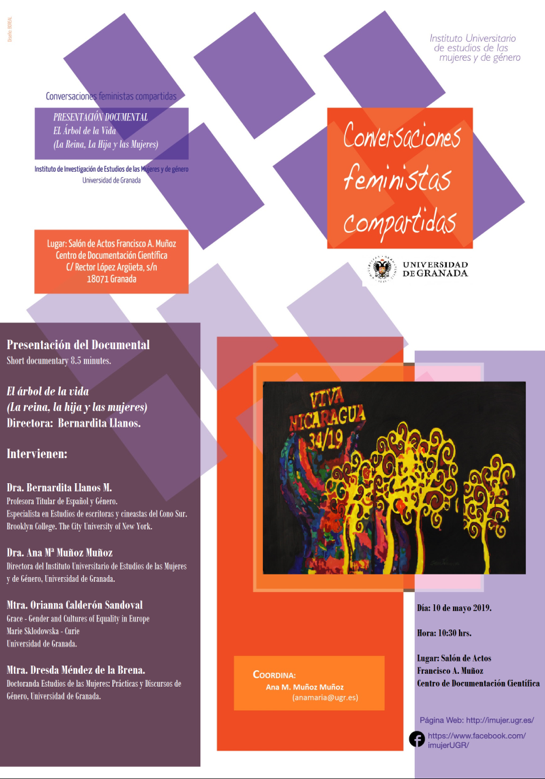
On May 10th the short documentary “El árbol de la vida. La reina, la hija y las mujeres” (“The Tree of Life. The Queen, the Daughter, and the Women”) was shown at the Francisco A. Muñoz Hall. Hosted by the “Shared Feminist Conversations” space, this event brought together the interventions of Bernardita Llanos (Director of the documentary and professor at Brooklyn College, City University of New York), Ana María Muñoz Muñoz (Director of the University Institute for Women and Gender Studies), Orianna Calderón Sandoval (GRACE Gender and Cultures of Equality in Europe Researcher), and Dresda Méndez de la Brena (Doctoral Student in Women’s Studies: Gender Practices and Discourses, and coordinator of the GEMMA Master).
The documentary strings together the stories of Zoilamérica Ortega Murillo, Rosa Murillo (Zoilamérica’s mother and Nicaragua’s vice-president), and the leaders of the women’s movement. In this film, the author reflects on how the political and sexual abuses at the heart of the presidential family extend to the Nicaraguan society. The feminist activists interviewed in the documentary defy the authority by questioning the corruption and the patriarchal power of a society that diverted from the revolutionary course of the 70s and evolved into an oppressive neoliberal regime in the head of a presidency that exerts violence over the citizens.
The first lady Rosario Murillo, recently designated vice president by her husband, the Nicaraguan President Daniel Ortega, became a public enemy of her daughter. By means of her influence, she supported Daniel Ortega and defended him against Zoilamérica’s accusations of recurrent sexual violations and harassment over the past three decades.
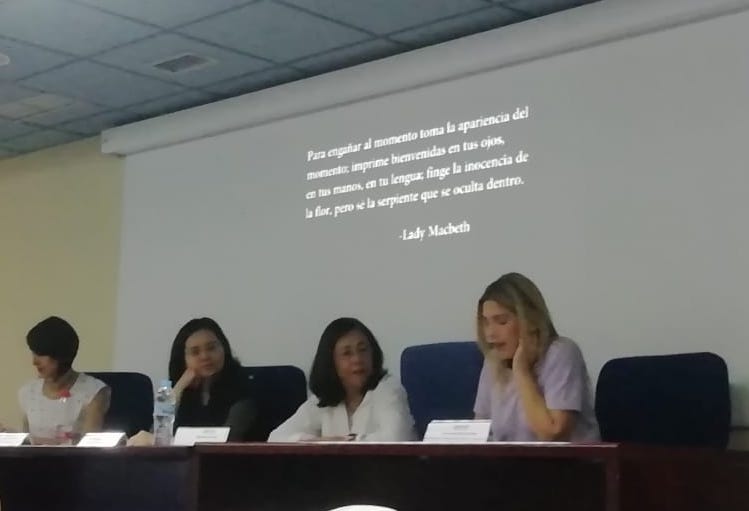
Shared feminist conversations: “The poetic reason of Maria Zambrano as a method for oral history”. Conversation with Aurora G. Morcillo
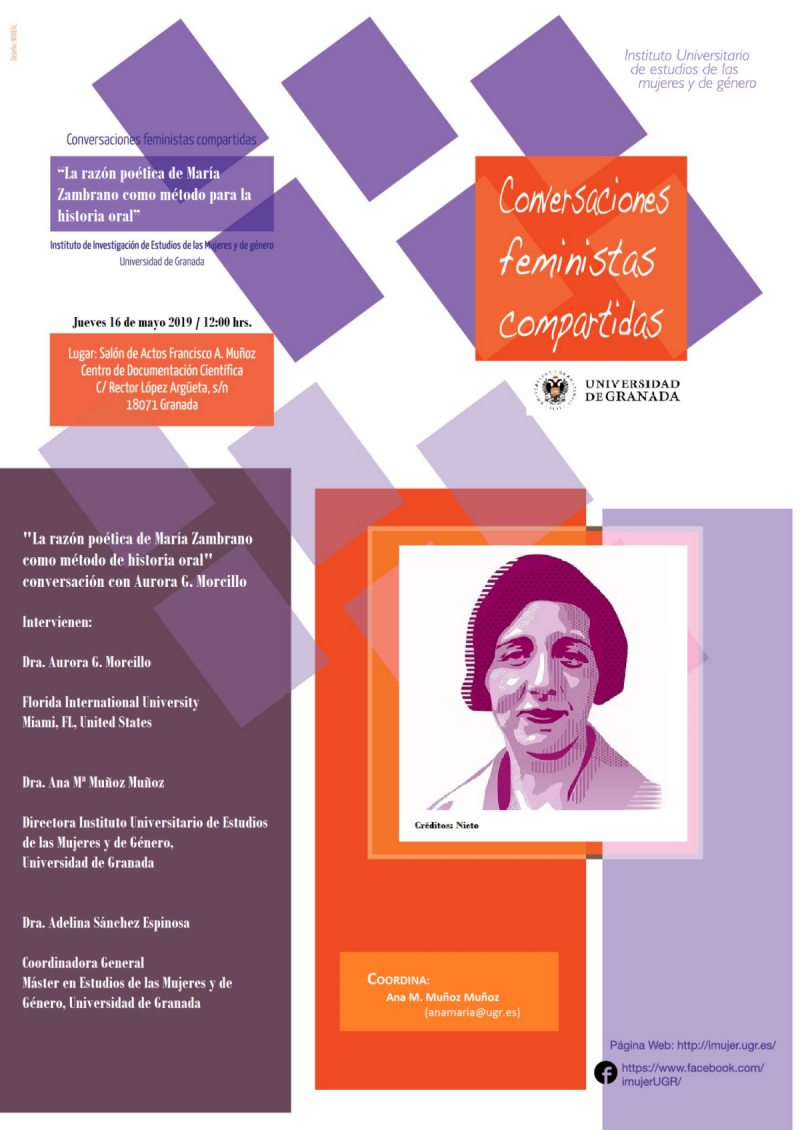
On the 16th of May, Aurora Morcillo Gómez joined the “Shared Feminist Conversations” space with an intervention titled “The poetic reason of Maria Zambrano as a method for oral history”. Aurora Morcillo is professor of History of Spain and Gender Studies at the Department of History of the Florida International University (Miami, USA) and she is also a specialist in Gender History during the Franco dictatorship. During this event, professor Morcillo discussed her research with Ana Muñoz Muñoz, director of the University Institute for Women and Gender Studies, and Adelina Sánchez Espinosa, coordinator of the GEMMA Consortium.
June 2019
Conference: “Beyond the Pink Tide: Thinking beyond the nation-state”
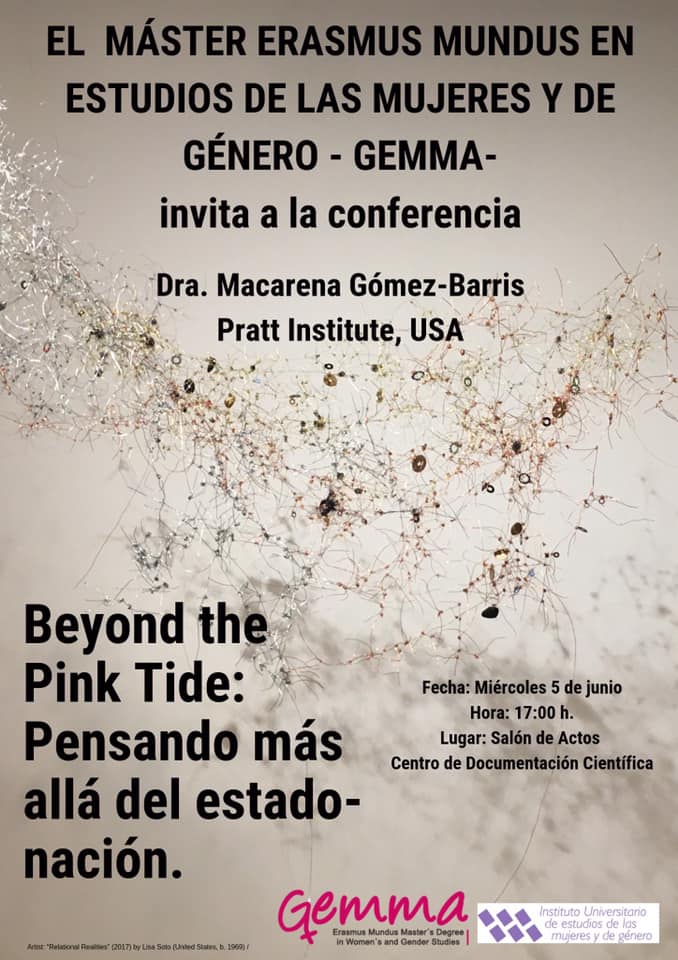
The conference “Beyond the Pink Tide: Thinking beyond the nation-state” took place at the Francisco A. Muñoz Hall on June 5th. After a five-day seminar at the Master GEMMA, the guest professor Macarena Gómez-Barris (Pratt University, USA) closed the seminar with this talk. During this event and the previous days, professor Gómez-Barris’ intervention addressed a range of topics related with de-colonial thought as refracted and imaged through feminist, queer, migrant, trans-feminist, and global perspectives.
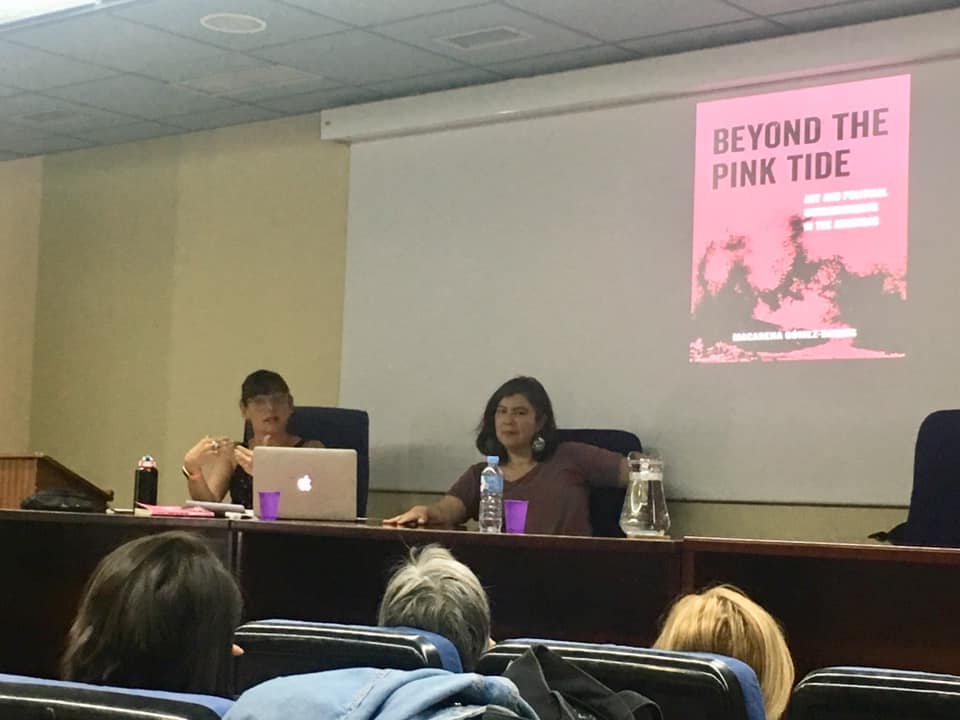
Workshop: “Autobiographical Comics, In and Out of the Classrooms”
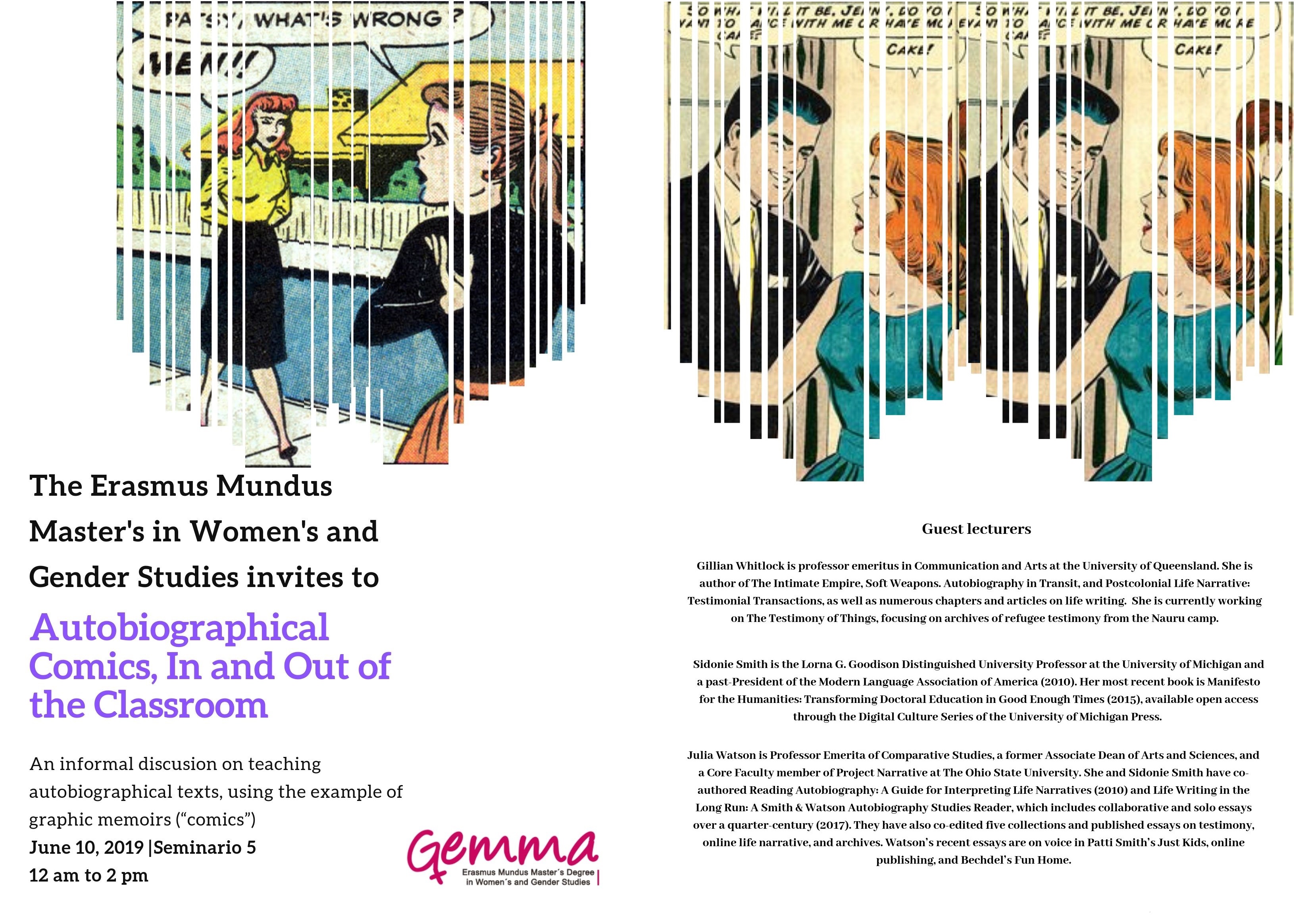
On the 10th of June, the Master GEMMA hosted the workshop “Autobiographical Comics, In and Out of the Classrooms”. The discussion was moderated by three distinguished scholars in the field of women’s autobiographical acts and practices: Gillian Whitlock (Queensland, Australia), Sidonie Smith (University of Michigan, USA), and Julia Watson (Ohio State University, USA). During this space, the lecturers addressed several key points for the analysis of autobiographical texts, using the example of graphic memoirs as multilayered, powerful means through which women narrate their lives.
Feminist shared conversations: “Abortion across borders”
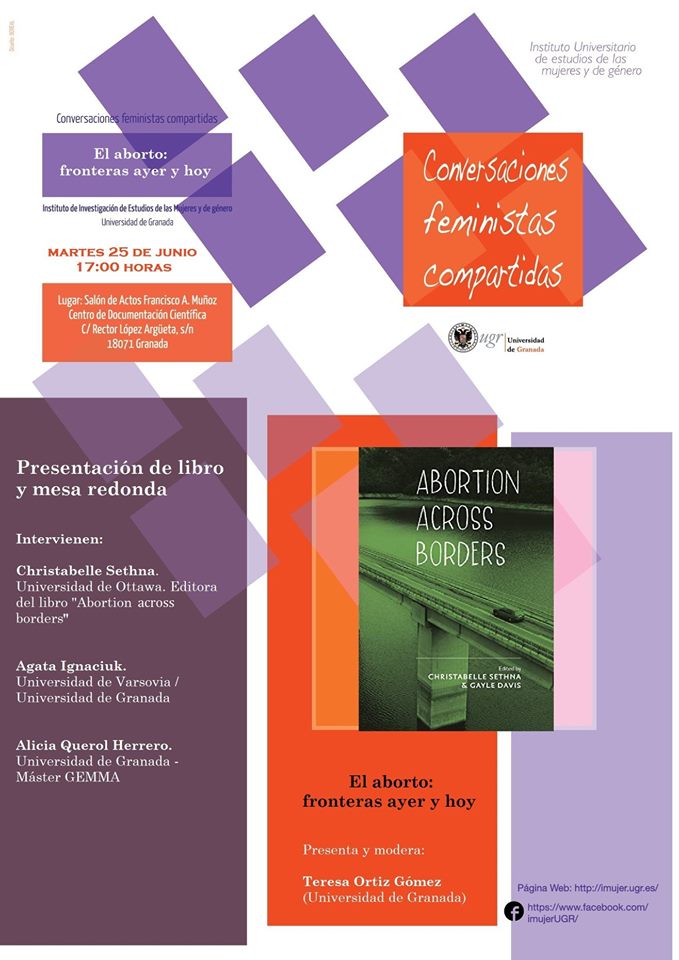
On the 25th of June the “Feminist Shared Conversations” space hosted the presentation and discussion of the book “Abortion across borders”. The round table consisted on the interventions of Christabelle Sethna (Ottawa University, book editor), Agata Ignaciuk (University of Warsaw/University of Granada) and Alicia Querol Herrero (GEMMA Master student), with the moderation of Teresa Ortiz Gómez (GEMMA Master professor, University of Granada). The book focuses on travel across domestic and international boundaries to terminate a pregnancy, in contexts where safe, legal, and affordable abortion is not recognized as an essential medical service for women.

